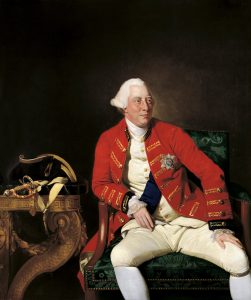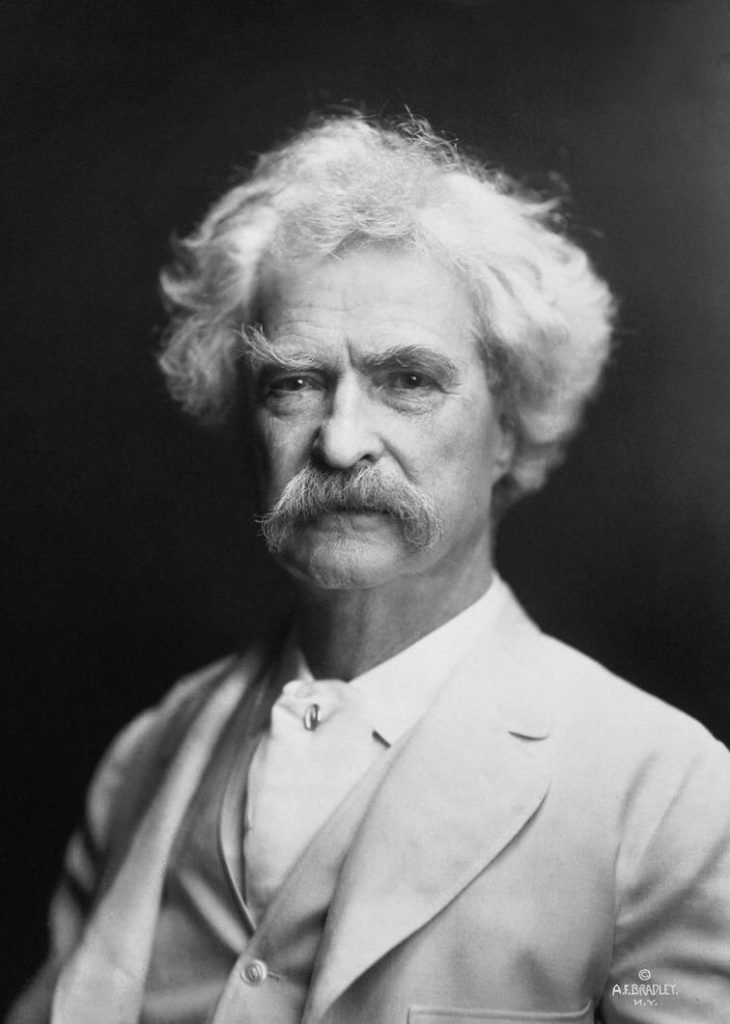
Mark Twain (Wiki image).
Introduction
Political humor has been used throughout history to challenge authority, criticize the powerful, and provide comedic relief from the harsh realities of life. It can be a powerful tool for social commentary and has the potential to spark change.
Ancient Greece and Rome:
Political humor was a popular form of entertainment in ancient Greece and Rome. It was often used to make fun of politicians and to poke fun at the ruling class.
-
In ancient Greece, comedians like Aristophanes used satire to criticize the government and to promote social reform.
-
In ancient Rome, comedians like Juvenal used political humor to attack the corruption and decadence of the Roman Empire.
Middle Ages:
Political humor continued to be popular in the Middle Ages. It was often used to criticize the Church and the nobility.
- In medieval Europe, jesters used humor to entertain the king and his court. They were often allowed to make fun of the king and his advisors, and they sometimes used their humor to criticize the government.
Renaissance:
Political humor became more sophisticated during the Renaissance. It was often used to explore philosophical and social issues.
-
In Renaissance Italy, writers like Niccolò Machiavelli used political humor to explore the nature of power and politics.
-
In England, writers like Sir Thomas More used political humor to criticize the government and to promote social reform.
Enlightenment:
Political humor was used during the Enlightenment to promote rationalism and challenge traditional beliefs.
-
In France, writers like Voltaire used political humor to criticize the monarchy and the Church.
-
In England, writers like Jonathan Swift used political humor to criticize the government and to promote social reform.
Romantic Era:
Political humor explored themes of love, death, and the human condition during the Romantic era.
-
In Germany, writers like Heinrich Heine used political humor to criticize the government and to promote social reform.
-
In England, writers like Lord Byron used political humor to express their disillusionment with the world.
Victorian Era:
Political humor became more tame and polite during the Victorian era. It was often used to avoid social conflict.
-
In England, writers like Charles Dickens used political humor to criticize the government and to promote social reform.
-
In America, writers like Mark Twain used political humor to criticize the government and to promote social reform.
20th Century:
Political humor became more diverse and subversive in the 20th century. It was often used to challenge authority and to explore taboo subjects.
-
In the United States, political humorists like Lenny Bruce and George Carlin used their humor to challenge the status quo.
-
In the United Kingdom, political humorists like Monty Python used their humor to satirize the government and to promote social reform.
21st Century:
Political humor continues to evolve in the 21st century. It is now more widely shared and distributed than ever before.
-
In the United States, political humorists like Stephen Colbert and Jon Stewart use their humor to challenge the government and to promote social reform.
-
In the United Kingdom, political humorists like Armando Iannucci use their humor to satirize the government and to promote social reform.
Political humor is a powerful tool that can be used to entertain, educate, and challenge. It can force social change and help us make sense of the world around us.
AI Political Humor 1500-24
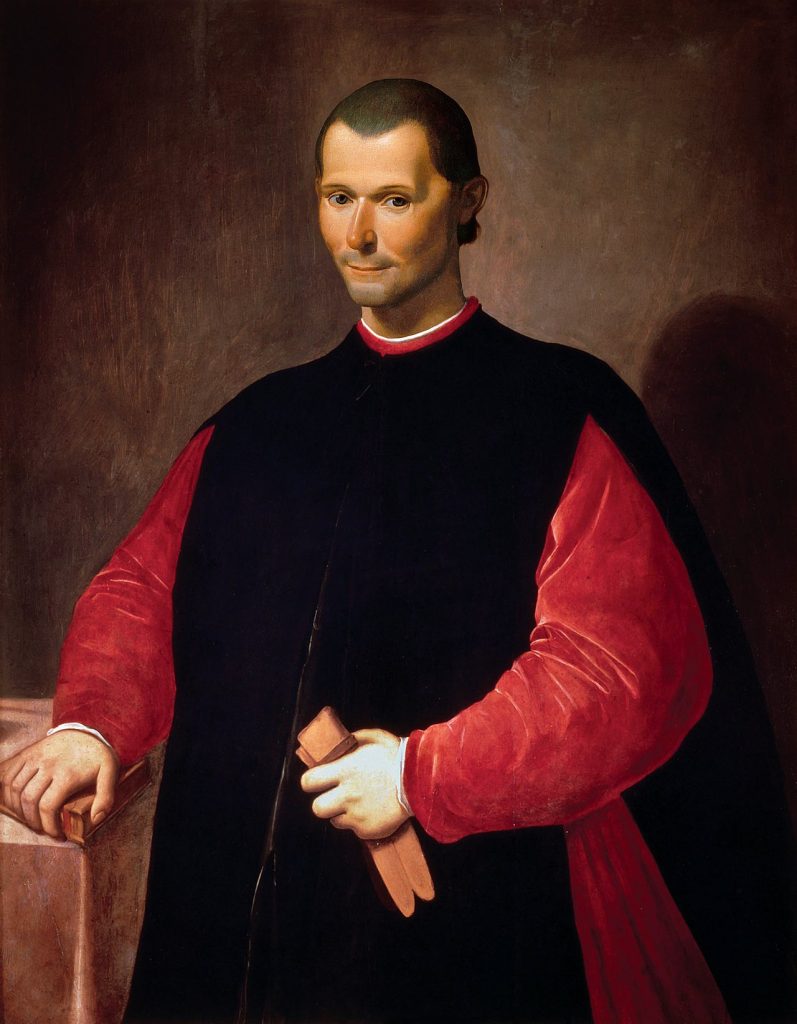 Niccolò Machiavelli (Wiki Image).
Niccolò Machiavelli (Wiki Image).
Sure, here are some examples of political humor with authors from 1500-1524:
Niccolò Machiavelli:
- From “The Prince”:
“It is better to be feared than loved if you cannot be both.”
“All wars are just, and all men fight with the same courage.”
“A prince must learn how to employ foxes and lions, for the fox knows the traps and the lion scares off the wolves. Therefore, a wise prince must be skillful in employing both methods.”
Desiderius Erasmus:
- From “The Praise of Folly”:
“Kings are said to be touched by God, but I think they are more touched by ambition.”
“It is easier to find a man with a beard without a head than a head without a beard.”
“The only way to govern the world is by being governed by wisdom.”
William Tyndale:
- From “The Obedience of a Christian Man”:
“The king has no more authority than the constable.”
“The pope is not Christ’s vicar, but the Antichrist.”
“The only obedience that a Christian man owes to a king is that which is not contrary to the law of God.”
Thomas More:
- From “Utopia”:
“The Utopians do not think that gold is a precious metal, but rather a useless thing that can be used to make chains.”
“The Utopians believe that war is never a just cause, and they will only fight if they are attacked.”
“The Utopians believe that all people are equal, regardless of their social status.”
Erasmus of Rotterdam:
- From “Adagia”:
“The people have a right to overthrow a tyrant.”
“The pope is not infallible, and his decrees can be overturned by a general council.”
“The Church should be reformed from within.”
These are just a few examples of political humor written during the 1500-1524. These authors were unafraid to speak their minds, even when criticizing the powerful. Their work helped to shape the political discourse of the time and continues to be relevant today.
AI Political Humor 1525-49
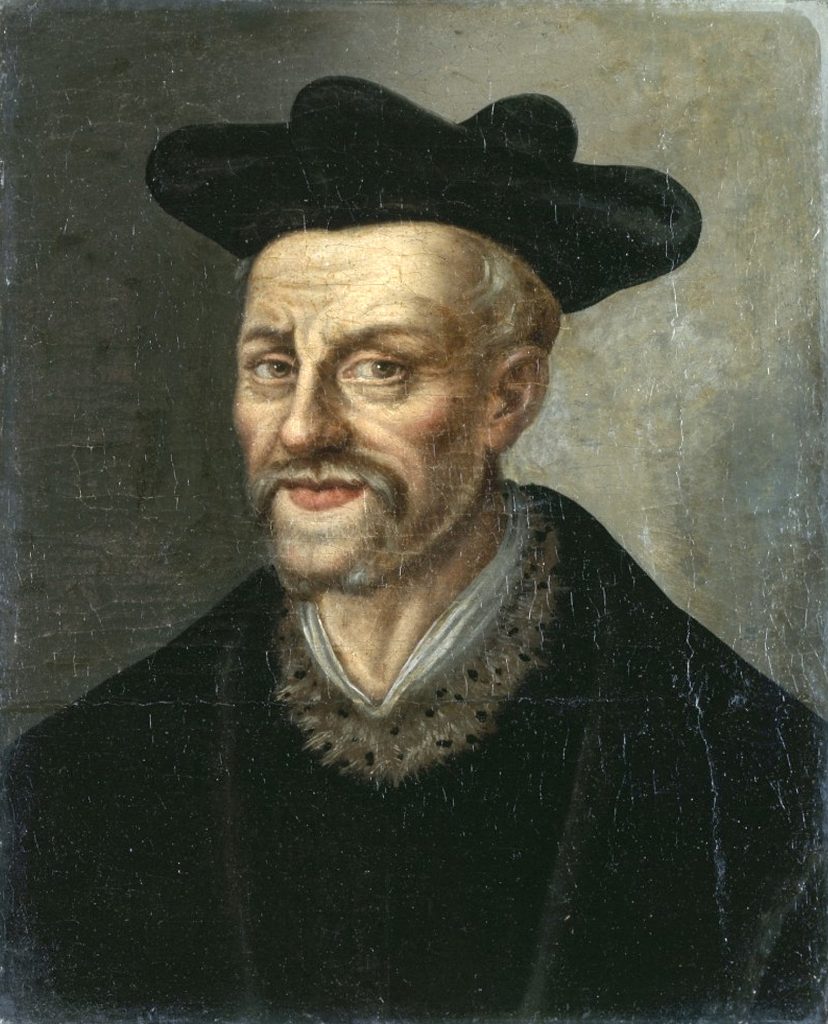
François Rabelais (Wiki Image).
Sure, here are some examples of political humor with authors from 1525-1549:
François Rabelais:
Rabelais’s novel “Gargantua and Pantagruel” is a satirical masterpiece that skewers his time’s political, religious, and social institutions. Here are a few examples of political humor from the novel:
-
“The only way to govern the world is to be governed by a wise woman.”
-
“The pope is a big fat nothing.”
-
“The king is a big fool.”
Michel de Montaigne:
Montaigne’s essays are known for their wit, wisdom, and skepticism. Here are a few examples of political humor from his essays:
-
“The only way to be truly free is to be free from the desire to control others.”
-
“The best government is the one that governs the least.”
-
“The only way to defeat corruption is to make it unprofitable.”
John Calvin:
Calvin’s “Institutes of the Christian Religion” is a major work of Protestant theology. However, Calvin also had a keen eye for political satire. Here are a few examples of political humor from his writings:
-
“The only way to reform a society is to start with the individual.”
-
“The only way to defeat tyrants is to overthrow them.”
-
“The best government is the one that is based on the rule of law.”
William Shakespeare:
Shakespeare’s plays are filled with political intrigue, power struggles, and social commentary. Here are a few examples of political humor from his plays:
-
“Power corrupts, and absolute power corrupts absolutely.”
-
“The first thing we do, let’s kill all the lawyers.”
-
“The best kind of ruler is feared by his enemies and respected by his allies.”
Miguel de Cervantes:
Cervantes’s novel “Don Quixote” is a satirical masterpiece that lampoons the chivalric romances of his time. However, Cervantes also uses his novel to satirize his time’s political and social institutions. Here are a few examples of political humor from the novel:
-
“The only way to defeat a giant is to laugh at him.”
-
“The best way to govern a country is to leave it alone.”
-
“The only way to achieve true freedom is to free yourself from the chains of your own mind.”
These are just a few examples of political humor written during the 1525-1549 period. These authors were unafraid to speak their minds, even when criticizing the powerful. Their work helped to shape the political discourse of the time and continues to be relevant today.
AI Political Humor 1550-74
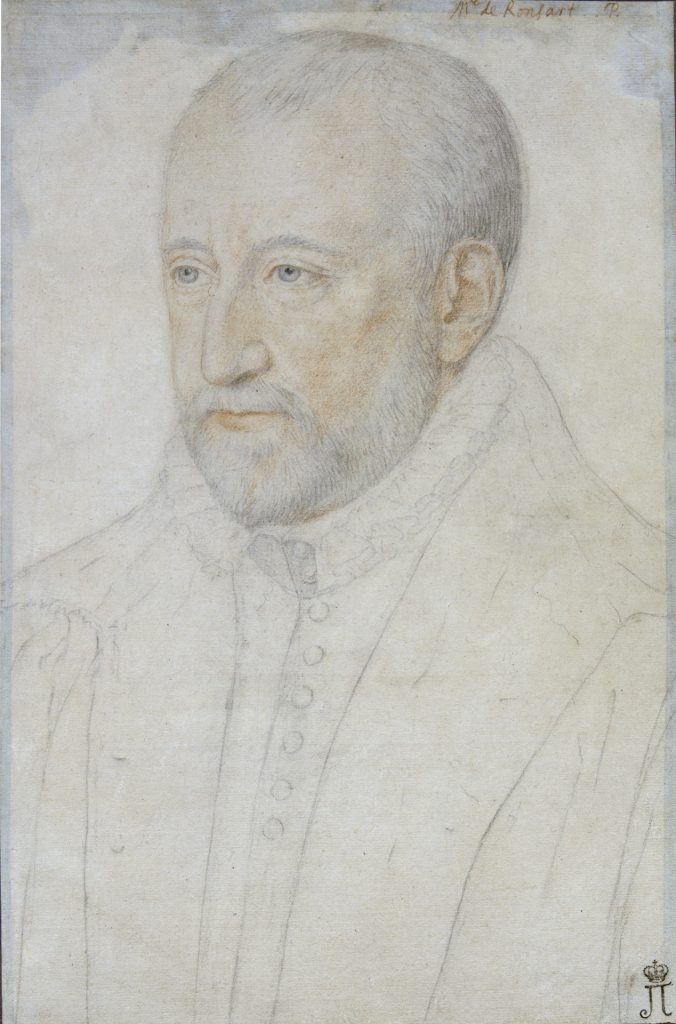
Pierre de Ronsard (Wiki Image).
Sure, here are some examples of political humor with authors from 1550-1574:
Pierre de Ronsard:
Ronsard, a prominent French poet of the 16th century, often incorporated political commentary into his verses. His satirical wit was evident in his critical portrayal of the French monarchy and its corrupt practices.
-
“The king’s court is a cesspool of greed and ambition.”
-
“The nobles are more concerned with their own wealth and power than the welfare of the people.”
-
“The monarchy is a bloated and inefficient institution that needs to be reformed.”
Miguel de Cervantes:
Cervantes’s satirical novel “Don Quixote” not only parodied chivalric romances but subtly critiqued the political and social landscape of 16th-century Spain.
-
“The pursuit of chivalric ideals is often misguided and can lead to foolish actions.”
-
“The blind adherence to tradition and outdated beliefs can hinder progress and innovation.”
-
“The contrast between the idealism of Don Quixote and the harsh realities of the world serves as a commentary on the human condition.”
William Shakespeare:
Shakespeare, a master of language and human nature, infused his plays with political insights, often through witty dialogue and allegorical characters.
-
“Power corrupts, and absolute power corrupts absolutely.”
-
“Politics is a dirty game played by those who thirst for power.”
-
“The common people are often the victims of political machinations.”
Giacomo da Ponte, also known as Tintoretto:
Tintoretto’s dynamic and dramatic paintings often reflected the political turmoil of 16th-century Venice. His use of bold colors and dramatic lighting mirrored the intensity of political struggles and power shifts.
-
“The use of light and shadow in Tintoretto’s paintings symbolizes the contrast between order and chaos, stability and instability, which were prevalent themes in Venetian politics.”
-
“Tintoretto’s depiction of dramatic scenes and powerful figures reflects the intensity and intrigue of political maneuvering in Venice.”
Michelangelo Buonarroti:
Michelangelo, a Renaissance master of sculpture, painting, and architecture, also dabbled in political commentary. His unfinished work “The Fall of the Rebel Angels” is believed to represent the expulsion of the Medici family from Florence, a political event that significantly impacted Michelangelo’s life.
-
“Michelangelo’s use of powerful imagery and symbolism in his art often reflected his political views and criticisms.“
-
“The unfinished nature of “The Fall of the Rebel Angels” could be interpreted as a commentary on the complexity and uncertainty of political affairs.“
These examples illustrate how authors of the 1550-1574 period employed humor, satire, and allegory to critique political systems, social norms, and the actions of those in power. Their works serve as a reminder of the enduring power of art to challenge authority and spark social change.
AI Political Humor 1575-99
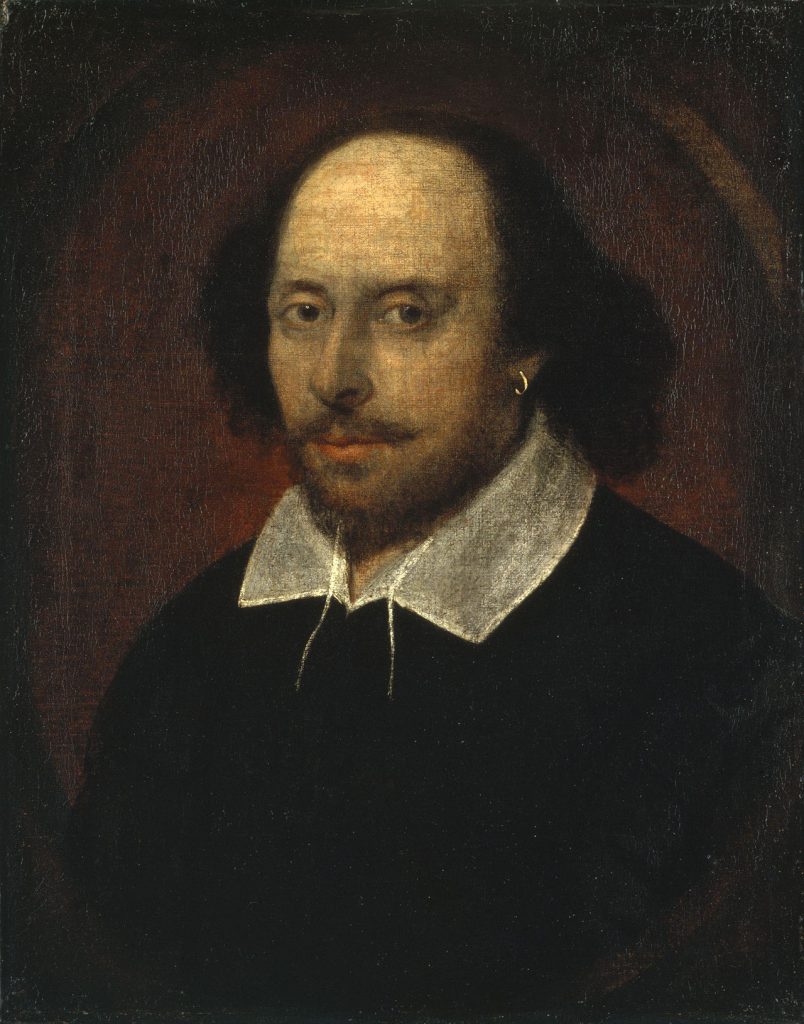
William Shakespeare (Wiki Image).
Sure, here are some examples of political humor with authors from 1575-1599:
William Shakespeare:
- From “Hamlet”:
“There is nothing either good or bad, but thinking makes it so.”
“The play’s the thing wherein I’ll catch the conscience of the king.”
“To be or not to be, that is the question.”
- From “King Lear”:
“Power corrupts, and absolute power corrupts absolutely.”
“The fault is not in our stars, but in ourselves that we are underlings.”
“Nothing will come of nothing.”
Edmund Spenser:
- From “The Faerie Queene”:
“True virtue lies in striving for the highest ideals, even if they seem unattainable.”
“The human condition is a constant battle between good and evil, and the individual must choose which side to fight for.”
“True power lies not in external forces, but in one’s own inner strength and moral compass.”
Christopher Marlowe:
- From “Doctor Faustus”:
“The pursuit of knowledge at all costs can lead to one’s downfall.”
“The human hunger for power and immortality can lead to a loss of one’s soul.”
“The devil is often not an external force, but rather a reflection of one’s own inner desires.”
Ben Jonson:
- From “Volpone”:
“Greed and avarice can lead to one’s own downfall.”
“The pursuit of wealth and material possessions can corrupt the human spirit.”
“True happiness is not found in external possessions, but in genuine human relationships.”
AI Political Humor 1600-24
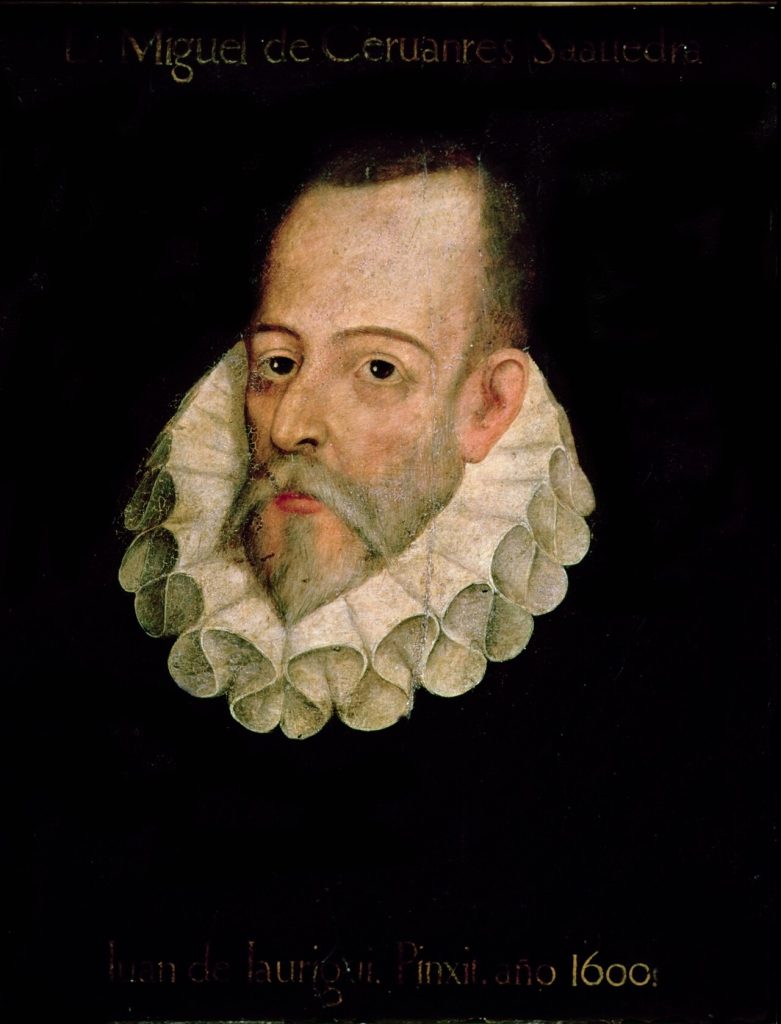
Miguel de Cervantes (Wiki Image).
Sure, here are some examples of political humor with authors from 1600-1624:
Miguel de Cervantes:
- From “Don Quixote”:
“The king’s advisors are more concerned with their own wealth and power than the welfare of the people.”
“The monarchy is a bloated and inefficient institution that needs to be reformed.”
- From “The Parnassus Trilogy”:
“Politicians are often more interested in self-promotion than in serving the public interest.”
“The political system is corrupt and favors the wealthy and powerful.”
- From “The Travels of Persiles and Sigismunda”:
“The pursuit of political power can lead to one’s downfall.”
“True power lies not in external forces, but in one’s own inner strength and moral compass.”
William Shakespeare:
- From “Measure for Measure”:
“Justice is often blind and can be manipulated by those in power.”
“The individual must be willing to stand up for what is right, even in the face of corruption.”
- From “The Tempest”:
“Power can corrupt, even those with the best intentions.”
“Leadership requires not only authority but also wisdom and compassion.”
- From “Coriolanus”:
“Politicians often use rhetoric and manipulation to gain power.”
“The public can be easily swayed by populist rhetoric and flattery.”
John Donne:
- From “Satire I”:
“The pursuit of wealth and power is often futile and can lead to one’s own downfall.”
“True happiness is found in love, friendship, and spiritual fulfillment.”
- From “Satire II”:
“The corruption and hypocrisy of the ruling class are often hidden beneath a veneer of piety.”
“The individual must be critical of authority and not accept everything at face value.”
- From “Satire III”:
“Religious extremism and intolerance can lead to violence and persecution.”
“True religion is based on love, compassion, and tolerance.”
Francis Bacon:
- From “Essays”:
“Politics is a complex and unpredictable game; success often depends on luck and manipulation.”
“The individual must be adaptable and willing to compromise to succeed in politics.”
- From “New Atlantis”:
“Utopian societies are often unrealistic and impractical.”
“True progress comes from gradual reform and a willingness to experiment with new ideas.”
- From “The New Organon”:
“Empirical observation and scientific inquiry are essential for understanding the world and making sound decisions.”
“Political leaders should base their decisions on evidence and reason, not prejudice and tradition.”
These examples illustrate how authors of the 1600-1624 period employed political humor to critique social norms, the actions of those in power, and the inherent complexities of political systems. Their works resonate today, reminding us of the importance of critical thinking, social commentary, and the pursuit of truth in the face of political maneuvering.
AI Political Humor 1625-49

Pierre Corneille (Wiki Image).
Sure, here are some examples of political humor with authors from 1625-1649:
Pierre Corneille:
- From “Le Cid”:
“Honor and duty often conflict, and the individual must choose which is more important.”
“The pursuit of personal glory can lead to one’s downfall.”
- From “The Illusion”:
“Our perceptions of reality can be easily manipulated.”
“The individual must be cautious and not trust everything they see or hear.”
- From “The Liar”:
“Deception and manipulation can have unintended consequences.”
“Truthfulness is essential for building trust and maintaining healthy relationships.”
John Milton:
- From “Paradise Lost”:
“The abuse of power can lead to tyranny and oppression.”
“The individual must be vigilant in protecting their freedom and holding those in power accountable.”
- From “Areopagitica”:
“Censorship and suppression of free speech are harmful to society.”
“The open exchange of ideas is essential for intellectual progress and social reform.”
- From “Samson Agonistes”:
“Revenge is a destructive force that can consume the individual and those around them.”
“Forgiveness and reconciliation are essential for healing and personal growth.”
Thomas Hobbes:
- From “Leviathan”:
“Human nature is selfish and competitive, and life without a strong central government would be chaotic and violent.”
“The individual must surrender some of their freedoms in exchange for the security and stability provided by a strong government.”
- From “De Human Nature”:
“Human beings are motivated by self-interest and seek power and pleasure.”
“Morality is not innate but is based on social conventions and the fear of punishment.”
- From “De Cive”:
“The state is a powerful entity that has the right to control its citizens in order to maintain order and security.”
“Individuals have no rights except those granted to them by the state.”
These examples illustrate how authors of the 1625-1649 period employed political humor to explore complex philosophical and political concepts. Their works continue to be relevant today, prompting us to consider the nature of human nature, the role of government, and the balance between individual rights and societal order.
AI Political Humor 1650-74
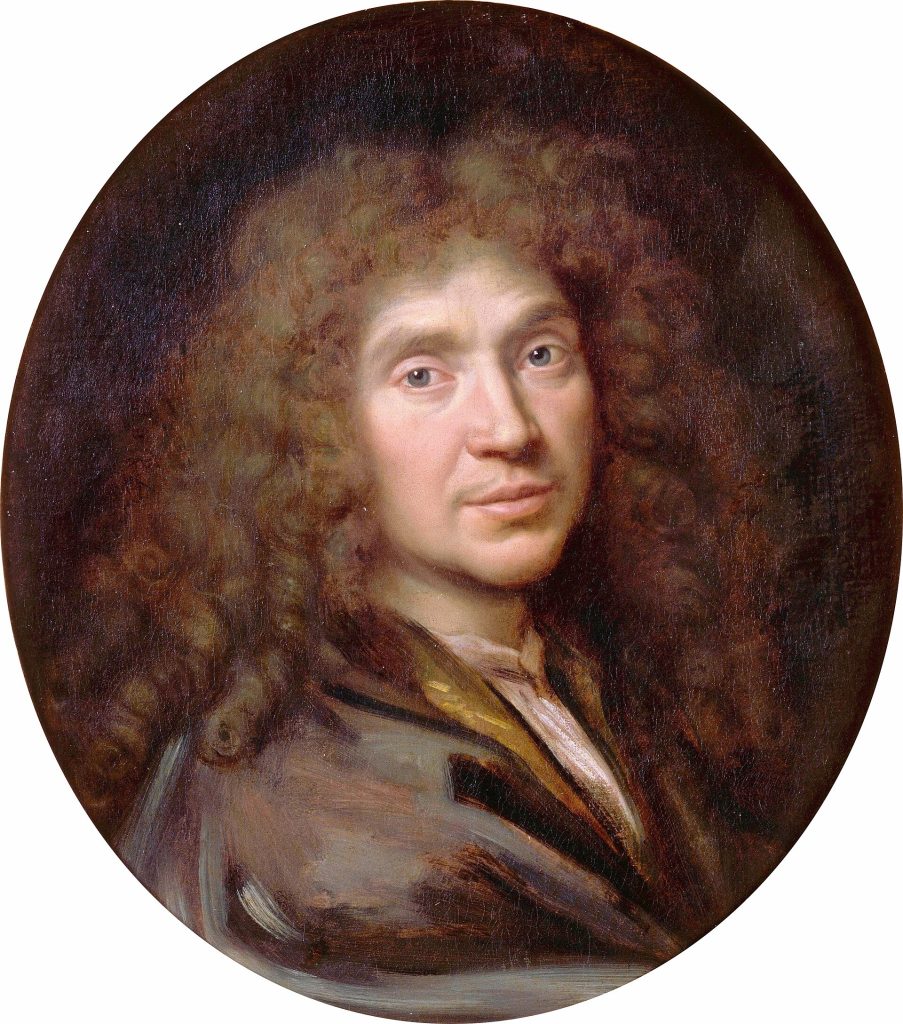
Molière (Wiki Image).
Sure, here are some examples of political humor with authors from 1650-1679:
Molière:
- From “Tartuffe”:
“Religious hypocrisy and fanaticism can be dangerous and destructive forces.”
“The individual must be critical of religious authority and not blindly accept everything they are told.”
- From “The Misanthrope”:
“Society’s obsession with appearances and social status can lead to hypocrisy and superficiality.”
“The individual must be true to themselves and not conform to societal pressures.”
- From “The School for Wives”:
“Controlling and manipulative behavior can stifle personal growth and genuine relationships.”
“Trust, respect, and open communication are essential for healthy relationships.”
John Dryden:
- From “Mac Flecknoe”:
“Mediocrity and bad taste can be elevated to prominence through political maneuvering and social influence.”
“True merit and artistic excellence are often overlooked in favor of popularity and connections.”
- From “Absalom and Achitophel”:
“Political rivalries and power struggles can have devastating consequences for the nation.”
“Moderation, compromise, and a willingness to listen to opposing viewpoints are essential for political stability.”
- From “The Hind and the Panther”:
“Religious differences and intolerance can lead to conflict and division.”
“Mutual respect, tolerance, and a focus on common ground are essential for religious coexistence.”
John Locke:
- From “Two Treatises of Government”:
“The power of government comes from the consent of the governed, and rulers must be held accountable to the people.”
“Individuals have natural rights, such as the right to life, liberty, and property, that cannot be arbitrarily taken away by the government.”
- From “A Letter Concerning Toleration”:
“Religious tolerance is essential for a peaceful and prosperous society.”
“Individuals should be free to practice their own religion without fear of persecution.”
- From “Some Thoughts Concerning Education”:
“Education is essential for individual growth, social progress, and good citizenship.”
“Schools should foster critical thinking, intellectual curiosity, and moral development.”
These examples illustrate how authors of the 1650-1679 period employed political humor to address critical issues of social order, religious tolerance, and the balance between individual rights and governmental authority. Their works continue to inspire debate and reflection on the fundamental principles of a just and equitable society.
AI Political Humor 1675-99
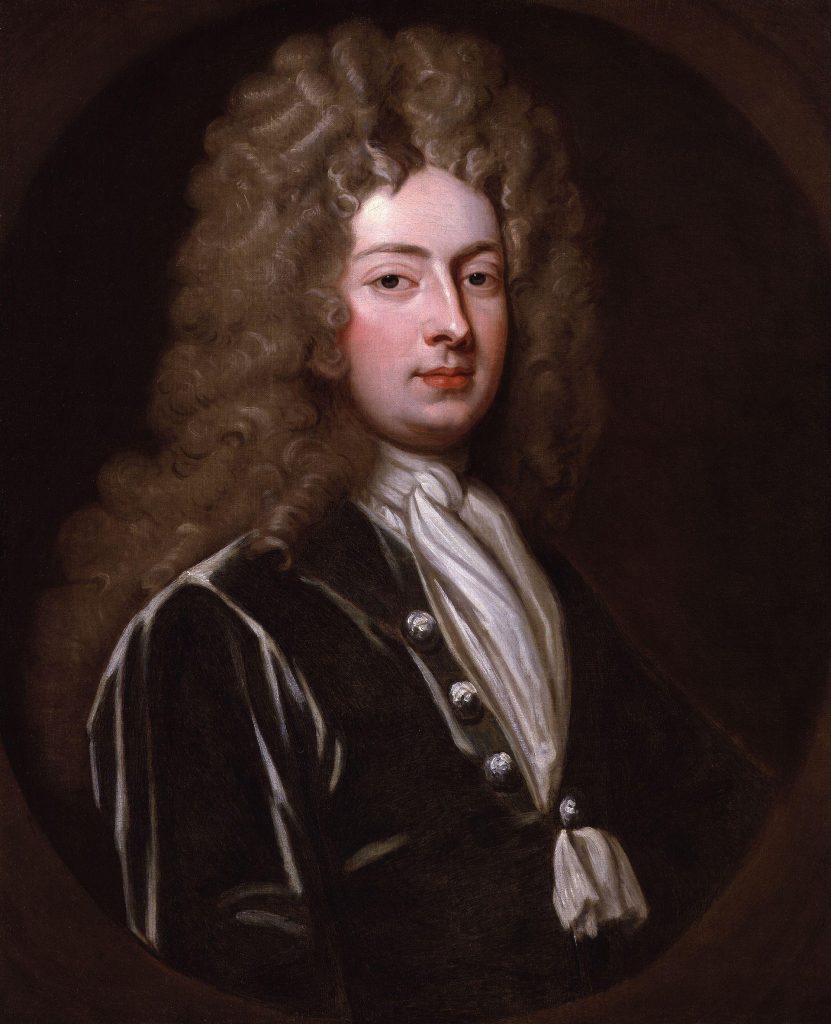
William Congreve (Wiki Image).
Sure, here are some examples of political humor with authors from 1675-1699:
William Congreve:
- From “The Way of the World”:
“Marriage is often seen as a social transaction rather than a genuine expression of love.”
“Wealth, status, and social standing are often valued more highly than genuine love and companionship.”
- From “The Double Dealer”:
“Hypocrisy, deception, and self-interest are prevalent in society, especially among the upper class.”
“Individuals often manipulate others for their own gain, regardless of the consequences.”
- From “Love for Love”:
“Love can be a powerful force that challenges societal norms and expectations.”
“Individuals may have to defy social conventions and family expectations in order to pursue true love.”
Jonathan Swift:
- From “Gulliver’s Travels”:
“Society’s obsession with appearances, power, and political maneuvering can lead to absurdity and injustice.”
“Individuals must be critical of societal norms and power structures and not blindly accept everything they see or hear.”
- From “A Modest Proposal”:
“Political and economic satire can be used to expose societal ills and challenge the status quo.”
“Humor can be a powerful tool for social commentary and can spark change.”
- From “A Tale of a Tub”:
“Religious fanaticism, extremism, and the blind adherence to tradition can lead to intolerance and conflict.”
“Individuals must be open-minded, tolerant, and willing to engage in rational discourse.”
Daniel Defoe:
- From “Robinson Crusoe”:
“Self-reliance, resourcefulness, and the ability to adapt to new circumstances are essential for survival.”
“Individuals must be willing to take risks and learn from their mistakes in order to overcome challenges.”
- From “Moll Flanders”:
“Society’s marginalization of women and the challenges they face in pursuing their own goals are highlighted.”
“Individuals must be resilient, resourceful, and determined to overcome societal barriers and achieve their dreams.”
- From “Roxana”:
“The pursuit of wealth, status, and social acceptance can lead to moral compromise and societal disapproval.”
“Individuals must be mindful of their values and not sacrifice their integrity for material gain or social standing.”
These examples illustrate how authors of the 1675-1699 period employed political humor to critique social norms, political systems, and the human condition. Their works resonate today, prompting us to examine societal structures, challenge authority, and strive for a more just and equitable world.
AI Political Humor 1700-24
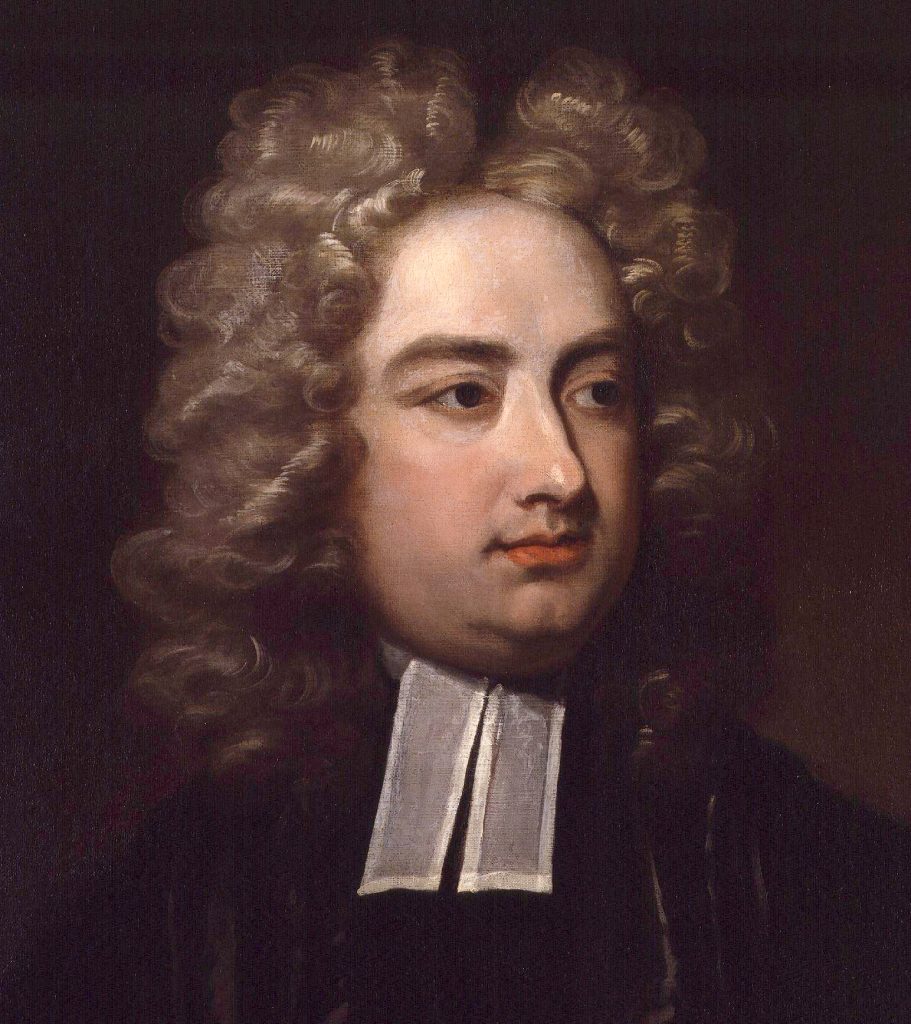
Jonathan Swift (Wiki Image).
Sure, here are some examples of political humor with authors from 1700-1724:
Jonathan Swift:
- From “The Intelligencer” (1710-11):
“Politicians are often more interested in their own self-promotion than in serving the public interest.”
“The political system is corrupt and favors the wealthy and powerful.”
- From “The Examiner” (1710-11):
“The government is often incompetent and wasteful.”
“The public is often easily swayed by populist rhetoric and flattery.”
- From “The Story of the Injured Farmer” (1712):
“The government is often indifferent to the plight of the common people.”
“Individuals must be vigilant in protecting their rights and holding those in power accountable.”
Alexander Pope:
- From “The Rape of the Lock” (1712, 1714):
“Society’s obsession with appearances and social status can lead to trivial pursuits and meaningless conflicts.”
“Individuals must focus on genuine connections and personal fulfillment rather than chasing superficial status symbols.”
- From “The Dunciad” (1728):
“Mediocrity and bad taste are often elevated to prominence through political maneuvering and social influence.”
“True merit and artistic excellence are often overlooked in favor of popularity and connections.”
- From “An Epistle to Dr. Arbuthnot” (1734):
“Political and literary satire can be used to expose societal ills and challenge the status quo.”
“Humor can be a powerful tool for social commentary and can spark change.”
Daniel Defoe:
- From “The Shortest Way with the Dissenters” (1702):
“Religious intolerance and persecution can have devastating consequences for society.”
“Individuals must be tolerant of different beliefs and strive for coexistence.”
- From “The History of the Union of Great Britain” (1709):
“Political conflicts and divisions can hinder national progress and unity.”
“Compromise, moderation, and a willingness to listen to different viewpoints are essential for political stability.”
- From “The True-Born Englishman” (1701):
“National identity and patriotism can be used to manipulate and control the public.”
“Individuals must be critical of nationalistic rhetoric and not blindly accept everything they are told.”
These examples illustrate how authors of the 1700-1724 period employed political humor to address critical issues of social order, religious tolerance, national identity, and the balance between individual rights and governmental authority. Their works continue to inspire debate and reflection on the fundamental principles of a just and equitable society.
AI Political Humor 1725-49
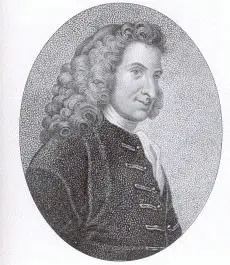
Henry Fielding (Wiki image).
Sure, here are some examples of political humor with authors from 1725-1749:
Henry Fielding:
- From “Tom Jones” (1749):
“Society’s obsession with social status and appearances can lead to hypocrisy, superficiality, and moral corruption.”
“Individuals must be true to themselves, embrace authenticity, and value genuine connections over societal expectations.”
- From “The History of the Adventures of Joseph Andrews and His Friend Mr. Abraham Adams” (1742):
“The pursuit of wealth and power can lead to moral compromise and a disregard for others’ well-being.”
“Individuals must prioritize integrity, compassion, and a sense of social responsibility over material gain and personal ambition.”
- From “The Life and Death of Jonathan Wild, the Great” (1743):
“Political corruption, greed, and the abuse of power can lead to societal ills and injustice.”
“Individuals must be vigilant in holding those in power accountable and demanding ethical leadership.”
Laurence Sterne:
- From “The Life and Opinions of Tristram Shandy, Gentleman” (1759-1767):
“Society’s obsession with conformity and adherence to social norms can stifle individuality and intellectual freedom.”
“Individuals must embrace their uniqueness, challenge conventional thinking, and pursue their own paths.”
- From “A Sentimental Journey Through France and Italy” (1768):
“Cultural differences and societal norms can lead to misunderstandings, prejudice, and missed opportunities for connection.”
“Individuals must be open-minded, tolerant, and willing to engage with different cultures and perspectives.”
- From “The Journal to Eliza” (1767):
“Love and relationships can be complex, unpredictable, and often humorous.”
“Individuals must embrace the imperfections and complexities of love while cherishing its joys and connections.”
Voltaire:
- From “Candide” (1759):
“The pursuit of happiness and the search for meaning in life can be challenging and often absurd.”
“Individuals must maintain a sense of optimism, cultivate resilience, and find meaning in their own experiences.”
- From “Letters on England” (1733):
“Political systems, social norms, and religious beliefs can be contradictory, irrational, and subject to satire.”
“Individuals must be critical of established norms, question authority, and promote tolerance and understanding.”
- From “Philosophical Dictionary” (1764):
“Wit, humor, and satire can be powerful tools for social commentary, challenging authority, and promoting enlightenment.”
“Laughter can be a catalyst for critical thinking, social change, and individual liberation.”
These examples illustrate how authors of the 1725-1749 period employed political humor to explore the complexities of human nature, social structures, political systems, and the pursuit of meaning in life. Their works inspire laughter, reflection, and a commitment to questioning the status quo and striving for a more just and enlightened society.
AI Political Humor 1750-74
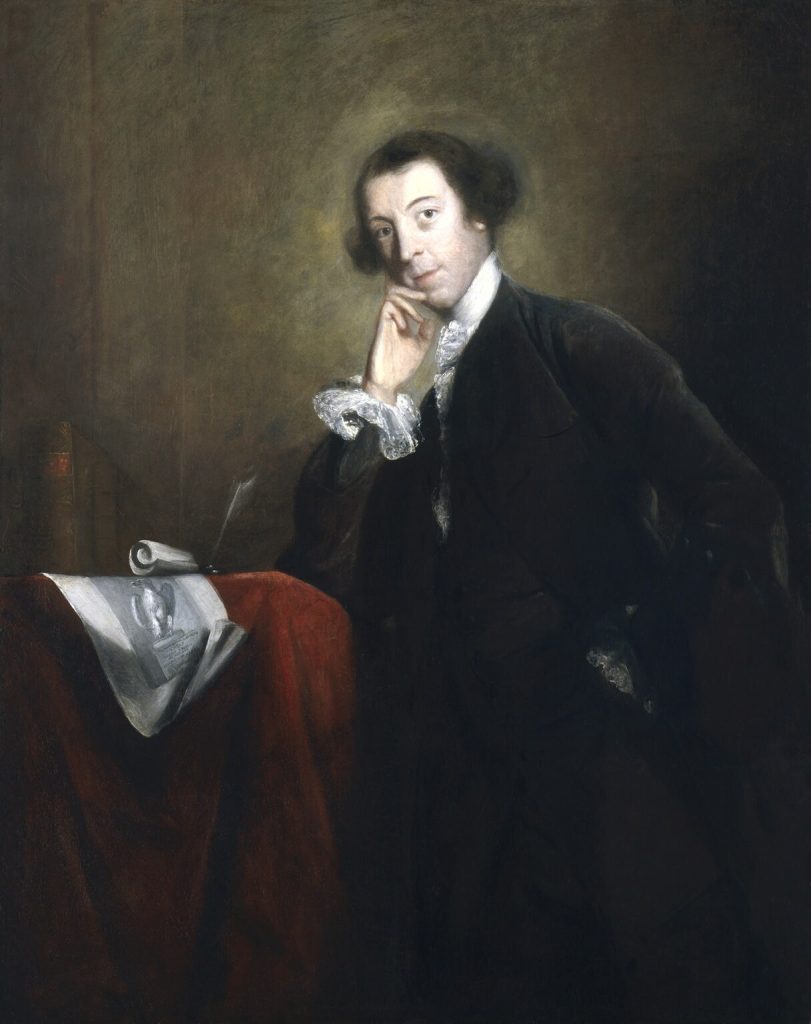
Horace Walpole (Wiki Image).
Sure, here are some examples of political humor with authors from 1750-1774:
Horace Walpole:
- From “The New Bath Guide” (1766):
“Society’s preoccupation with fashion, gossip, and social status can lead to superficiality, vanity, and an obsession with appearances.”
“Individuals must value genuine connections, meaningful experiences, and cultivate inner qualities over external conformity.”
- From “Memoirs of the Reign of George II” (1766):
“Political maneuvering, corruption, and the pursuit of personal gain can undermine the integrity of government and public service.”
“Individuals must demand transparency, accountability, and a commitment to the public good from those in power.”
- From “The Castle of Otranto” (1764):
“Gothic literature and the exploration of irrational fears, oppressive power structures, and the uncanny can serve as a critique of societal norms and political systems.”
“Art and literature can provide a space for questioning, challenging, and reimagining the world we inhabit.”
Denis Diderot:
- From “Encyclopédie” (1751-1772):
“The Enlightenment’s emphasis on reason, scientific inquiry, and individual liberty can lead to challenges to traditional authority and social structures.”
“Education, critical thinking, and the open exchange of ideas are essential for progress and social change.”
- From “Jacques le Fataliste et son maître” (1776):
“The concepts of free will, determinism, and the nature of human agency can be explored through philosophical dialogues and storytelling.”
“Literature can provoke thought, challenge assumptions, and invite reflection on the human condition.”
- From “Salon of 1767” (1767):
“Art criticism and the appreciation of beauty can be used to promote social commentary, challenge conventional norms, and celebrate human creativity.”
“Art can serve as a mirror to society, reflecting its strengths, weaknesses, and aspirations.”
David Hume:
- From “A Treatise of Human Nature” (1739):
“Human understanding is limited by our senses, experiences, and biases.”
“We must approach knowledge with humility, skepticism, and a willingness to revise our beliefs in light of new evidence.”
- From “Dialogues Concerning Natural Religion” (1779):
“The existence of God and the nature of religion are complex and open to debate.”
“We must engage in rational discourse, consider different perspectives, and respect the freedom of thought and belief.”
- From “An Inquiry Concerning the Principles of Morals” (1751):
“Morality is not based on divine revelation or innate principles but on human sentiments and social conventions.”
“We must develop our capacity for empathy, compassion, and a sense of justice.”
These examples illustrate how authors of the 1750-1774 period employed political humor to challenge authority, question societal norms, and promote Enlightenment ideals. Their works continue to inspire critical thinking, intellectual curiosity, and a commitment to the pursuit of truth and the betterment of society.
AI Political Humor 1775-99
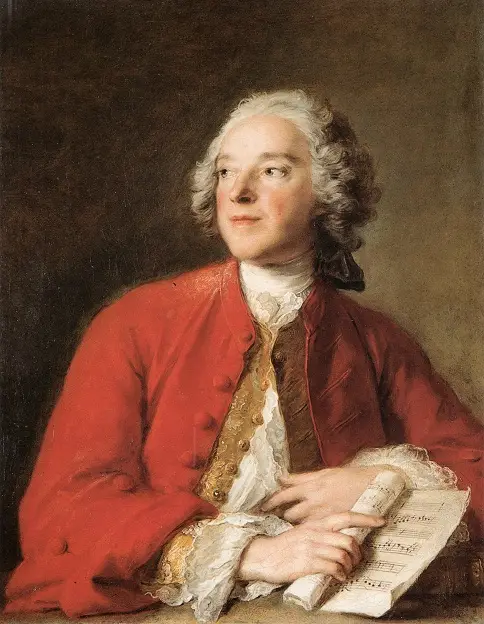
Pierre Beaumarchais (Wiki Image).
Sure, here are some examples of political humor with authors from 1775-1799:
Pierre Beaumarchais:
- From “The Marriage of Figaro” (1778):
“Social hierarchies, class divisions, and the abuse of power can lead to resentment, rebellion, and social upheaval.”
“Individuals must challenge unjust systems, demand equality, and strive for a more just and equitable society.”
- From “The Barber of Seville” (1775):
“Wit, cunning, and deception can be employed to outsmart authority figures and challenge social norms.”
“Individuals must sometimes bend or break the rules to achieve justice, protect the vulnerable, and pursue their own happiness.”
- From “The Guilty Mother” (1772):
“Parental control, the suppression of individual expression, and the pursuit of social status can lead to family conflicts and personal tragedies.”
“Individuals must prioritize open communication, respect for individual choices, and the pursuit of personal fulfillment over societal expectations.”
Jane Austen:
- From “Pride and Prejudice” (1813):
“Society’s obsession with wealth, social status, and marriage can lead to hypocrisy, superficiality, and a disregard for genuine connections.”
“Individuals must value authenticity, prioritize personal growth, and seek meaningful relationships based on love, respect, and mutual understanding.”
- From “Emma” (1815):
“Interference in others’ lives, meddling in personal affairs, and the abuse of social influence can lead to misunderstandings, hurt feelings, and unintended consequences.”
“Individuals must respect personal boundaries, exercise caution in offering advice, and prioritize empathy and understanding in their interactions with others.”
- From “Mansfield Park” (1814):
“The pursuit of wealth, social advancement, and self-interest can lead to moral compromise, hypocrisy, and a disregard for the well-being of others.”
“Individuals must uphold their moral compass, prioritize integrity and compassion, and strive for a life of virtue and personal fulfillment.”
Thomas Paine:
- From “Common Sense” (1776):
“The pursuit of political freedom, self-governance, and the consent of the governed is essential for a just and equitable society.”
“Individuals must challenge unjust authority, promote democratic principles, and actively participate in shaping their own government.”
- From “The Rights of Man” (1791):
“Individual rights, such as the right to life, liberty, and property, are inherent and should be protected by the government.”
“Individuals must be vigilant in guarding their rights, holding those in power accountable, and defending themselves from tyranny and oppression.”
- From “The Age of Reason” (1794):
“Reason, critical thinking, and skepticism should be applied to all aspects of life, including religion and politics.”
“Individuals must question established beliefs, challenge authority, and seek truth through rational discourse and empirical evidence.”
These examples illustrate how authors of the 1775-1799 period employed political humor to promote Enlightenment ideals, challenge societal norms, and advocate for individual liberty, political freedom, and a more just and equitable world. Their works inspire critical thinking, social reform, and the pursuit of a better society.
AI Political Humor 1800-24
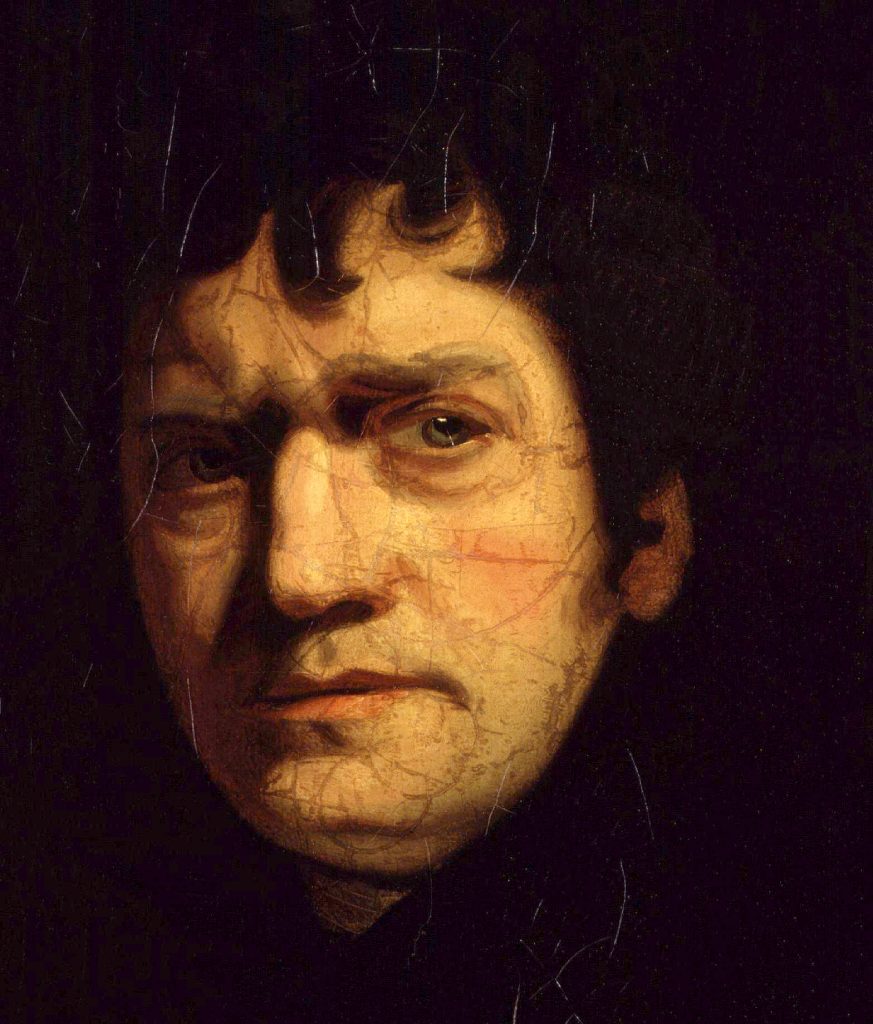
John Wolcot (Wiki Image).
Sure, here are some examples of political humor with authors from 1800-1824:
John Wolcot
- From “The Rolliad” (1795):
“A statesman we know, who was bold and profuse, In his speeches and votes for the war. But when he was ask’d for a loan or a goose, He straightway turned pale and looked poor.”
- From “The Works of Peter Pindar, Esq.” (1819):
“A king is a thing that can never meet, The wishes of subjects, though ne’er so sweet.”
William Hone
- From “The Political Housewife” (1820):
“The best way to govern a country is to keep it in ignorance.”
- From “The Man in the Moon” (1819-1821):
“A politician is a man who promises to pay you with your own money.”
William Cobbett
- From “Rural Rides” (1821-1823):
“A lawyer is a man who will do anything for money, except work.”
- From “Cobbett’s Weekly Register” (1802-1835):
“A politician is a man who will say anything for votes, except the truth.”
These are just a few examples of the many political satirists who wrote between 1800 and 1824. These authors used their wit and humor to challenge the powerful, expose corruption, and make people think. Their works remain relevant today as we face the same political challenges they did.
AI Political Humor 1825-49
Sure, here are some examples of political humor with authors from 1825-1849:
Charles Dickens
- From “Oliver Twist” (1838):
“The law is a ass – a vampire.”
- From “A Christmas Carol” (1843):
“If we can learn nothing else from this story, surely we can learn this: there are ghosts in the air. Even in the daytime.”
Thomas Carlyle
- From “The French Revolution” (1837):
“The greatest of all characters are those who do not need to be admired.”
- From “Past and Present” (1843):
“The universe, outside of God and his creation, is a chaos.”
Honoré de Balzac
- From “Eugénie Grandet” (1833):
“Money is like manure; it doesn’t smell good unless it’s spread.”
- From “Père Goriot” (1834):
“The only real voyage of discovery consists not in seeking new landscapes but in having new eyes to see them with.”
Thomas Hood
- From “The Song of the Shirt” (1843):
“With fingers weary and worn, With eyelids heavy and torn, From the pillow I rise at night, To make the garments for use and delight.”
- From “Miss Kilmansegg and Her Precious Leg” (1846):
“She was a great lady, with a great big leg, And a little foot, and a little head, too, Which kept her in a fever, dancing the egg.”
William Makepeace Thackeray
- From “Vanity Fair” (1848):
“A man may have money to buy him the pleasures of the world, but he cannot buy himself the power to enjoy them.”
- From “The Paris Sketch Book” (1840):
“A cook is an artist who, with a few simple ingredients, can create a masterpiece that will be devoured in minutes.”
These are just a few examples of political humorists who wrote between 1825 and 1849. These authors used their wit and humor to challenge the status quo, expose hypocrisy, and make people laugh. Their works remain relevant today as we grapple with the same political and social issues they did.
AI Political Humor 1850-74
Sure, here are some examples of political humor from 1850 to 1859, along with some of the authors who created it:
- Artemus Ward (1834-1867): Ward was an American humorist and journalist known for his dry wit and satirical take on American politics. He was a popular lecturer and writer, and his work was often reprinted in newspapers and magazines.
- From “Artemus Ward’s Complete Works” (1861):
“I am in favor of a cushty government, but it must not be too cushty. If the government is too cushty, the people will get lazy and will not work. If the people do not work, they will not make any money. If they do not make any money, they will not be able to pay taxes. If they cannot pay taxes, the government will not have any money. And if the government does not have any money, it will not be cushty at all.”
- Thomas Nast (1840-1902): Nast was a German-American caricaturist considered the father of American political cartoons. His most famous character was Uncle Sam, and his cartoons helped shape public opinion on various issues, including corruption, immigration, and war.
- From “Harper’s Weekly” (1869):
-
“The Tweed Ring” (1871): Nast’s cartoon of the Tweed Ring, a corrupt political machine in New York City, was one of his most famous and influential. The cartoon helped bring down the Tweed Ring and made Nast a household name.
-
Josh Billings (1818-1885): Billings was an American humorist known for his homespun philosophy and his use of down-to-earth language. He was a popular writer and lecturer, and his work was often reprinted in newspapers and magazines.
- From “Josh Billings’ Complete Works” (1883):
“A politician is a man who gets your vote by telling you what you want to hear, and then does what he wants to do.”
- Henry David Thoreau (1817-1862): Thoreau was an American writer, philosopher, and naturalist. He is best known for his book “Walden” (1854), describing his two-year experiment in simple living at Walden Pond. Thoreau was also a strong critic of the government and was jailed for refusing to pay taxes.
- From “Resistance to Civil Government” (1849):
“There are infinitely more things to be said on the wrong side of a question than on the right.”
- “Civil Disobedience” (1848):
“I heartily commend the anti-state politics, as the only true anti-slavery politics.”
Petroleum V. Nasby
“I would rather have a barrel of money than a whole Congress full of politicians.”
A. B. Frost
“A politician is a man who thinks of the people on election day and himself the rest of the year.”
These are a few examples of political humorists who wrote between 1850 and 1874. These authors used their wit and humor to challenge the status quo, expose hypocrisy, and make people think. Their works remain relevant today, as we face the same political and social issues they did.
AI Political Humor 1875-99
Sure, here are some examples of political humor with authors from 1875-1899:
Mark Twain
- From “The Adventures of Tom Sawyer” (1876):
“The best way to teach a child about the value of money is to let them borrow some of yours.”
- From “The Adventures of Huckleberry Finn” (1885):
“You can’t learn anything by being told, you have to find things out for yourself.”
Oscar Wilde
- From “The Importance of Being Earnest” (1895):
“A man can’t be too careful in the choice of his friends. The friend who influences me may be wholly good, and the friend who imitates me may be wholly bad.”
- From “Lady Windermere’s Fan” (1892):
“A woman should never be too clever about money, or she may end up managing a boardinghouse.”
Samuel Butler
- From “Erewhon” (1872):
“The best way to govern a country is to keep it in ignorance.”
- From “The Way of All Flesh” (1903):
“A child is a thing that can never meet the wishes of parents, though ne’er so sweet.”
Ambrose Bierce
- From “The Devil’s Dictionary” (1881-1911):
“Politician: A creature who spends most of his time crawling on his stomach, and the remainder of it on his back.”
- From “The Cynic’s Word Book” (1906):
“Politician: A person who, when asked to point to the results of his labors, invariably points to the crowd around him.”
Gilbert K. Chesterton
- From “The Man Who Was Thursday” (1908):
“The first step in the evolution of a polite society is to learn that a lie must be an art.”
- From “Orthodoxy” (1908):
“A politician is a person who promises to pay you with your own money.”
These are a few examples of political humorists who wrote between 1875 and 1899. These authors used their wit and humor to challenge the status quo, expose hypocrisy, and make people laugh. Their works remain relevant today as we grapple with the same political and social issues they did.
AI Political Humor 1900-24
Sure, here are some examples of political humor with authors from 1900-1924:
Dorothy Parker
- From “Constant Reader” (1920):
“The best way to keep a thing is to give it away.”
- From “Not So Deep as a Well” (1923):
“The only thing worse than being talked about is not being talked about.”
H.L. Mencken
- From “The American Language” (1919):
“There are no new ideas, only new ways of expressing old ideas.”
- From “A Book of Prefaces” (1919):
“The more a man knows, the more he knows how little he knows.”
George Bernard Shaw
- From “Major Barbara” (1905):
“War is not an adventure. It is a disease.”
- From “Arms and the Man” (1898):
“The more a man has, the more he wants.”
Will Rogers
- From “The Autobiography of Will Rogers” (1925):
“I never met a man I didn’t like.”
- From “Rogers’ Dictionary” (1927):
“Politics is the art of getting what you want without having to give up what you want.”
G.K. Chesterton
- From “The Everlasting Man” (1925):
“Tradition is the democracy of the dead.”
- From “Orthodoxy” (1908):
“A politician is a person who promises to pay you with your own money.”
These are just a few examples of political humorists who wrote between 1900 and 1924. These authors used their wit and humor to challenge the status quo, expose hypocrisy, and make people laugh. Their works remain relevant today as we grapple with the same political and social issues they did.
AI Political Humor 1925-49
Sure, here are some examples of political humor with authors from 1925-1949:
George Orwell
- From “Animal Farm” (1945):
“All animals are equal, but some animals are more equal than others.”
- From “Nineteen Eighty-Four” (1949):
“War is peace. Freedom is slavery. Ignorance is strength.”
W.H. Auden
- From “Spain” (1937):
“In the future when books are rare, And precious as gold will be, They’ll say these lines were written by an Englishman, And praised his nonchalantness and irony.”
P.G. Wodehouse
- From “The Code of the Woosters” (1938):
“A gentleman is a man who is never rude to a woman, even if she deserves it.”
e.e. cummings
- From “The Enormous Room” (1922):
“The political is the personal.”
- From “i sing of olaf” (1923):
“a politician is an arsehole who is elected by other arseholes.”
Dorothy Parker
- From “The New Yorker” (1925-1949):
“A woman’s place is in the home.” “But what if she’s married to a politician?”
- From “Constant Reader” (1920):
“The only thing worse than being talked about is not being talked about.”
These are just a few examples of political humorists who wrote between 1925 and 1949. These authors used their wit and humor to challenge the status quo, expose hypocrisy, and make people laugh. Their works remain relevant today as we grapple with the same political and social issues they did.
AI Political Humor 1950-74
Sure, here are some examples of political humor with authors from 1950-1974:
George Carlin
- From “Stand-Up Comedy: The Carlin Years” (1971):
“I’m not a liberal or a conservative, I’m just an observer.”
- From “Class Clown” (1979):
“You’re not allowed to say ‘man’ anymore. You have to say ‘person.’ But ‘person’ is just a fancy word for ‘man’, so why not just say ‘man’?”
Art Buchwald
- From “Washington: Behind the Red Velvet Curtain” (1959):
“Washington is the only city where you can buy a newspaper and read it.”
- From “The Buchwald Stops Here” (1962):
“A politician is someone who promises to solve all the problems of the country, but then can’t even solve the problem of parking his car.”
Mort Sahl
- From “The New Yorker” (1952-1972):
“I used to think that politics was a serious business. But then I met some politicians.”
- From “Mort Sahl: The Way We Were” (1970):
“A politician is someone who can chew gum and talk at the same time.”
Jules Feiffer
- From “Cartoonist’s Notebook” (1965-1975):
“I don’t know what the future holds, but I know it will be different.”
- From “Feiffer” (1989):
“The only thing more dangerous than a politician is a politician with a sense of humor.”
Hunter S. Thompson
- From “Fear and Loathing in Las Vegas” (1972):
“We were somewhere around Barstow on the edge of the desert when the drugs began to take hold.”
- From “Fear and Loathing on the Campaign Trail ’72” (1972):
“Politics is the art of staying out of trouble.”
Tom Lehrer
- From “Poisoning Pigeons in the Park” (1959):
“I’ve got a song to sing, but I can’t think of any words. I’ve got a song to sing, but I’ve got no voice. I’ve got a song to sing, but I’m afraid to sing it. I’ve got a song to sing, but it’s too late.”
- From “That’s the Way I Want It” (1960):
“I think that politics is a very important subject for comedy. Because, if you can’t laugh at it, you’re going to cry.”
Gloria Steinem
- From “A Woman’s Place Is in the Revolution” (1969):
“The problem with the revolution is that it’s so damn successful. Nobody even knows it’s happening.”
- From “Outrageous Acts and Everyday Rebellions” (1983):
“The truth will set you free, but first it will piss you off.”
These are just a few examples of political humorists who wrote between 1950 and 1974. These authors used their wit and humor to challenge the status quo, expose hypocrisy, and make people laugh. Their works remain relevant today as we grapple with the same political and social issues they did.
AI Political Humor 1975-99
Political humor has existed for centuries, but it took on a new edge in the 1970s and 1980s. This was partly due to the rise of television, which gave comedians a wider audience. It was also due to the Watergate scandal, which shook the public’s trust in government and made politicians ripe for satire.
One of the most popular political comedians of the era was Monty Python. The British comedy troupe was known for its absurdist humor, often skewered politicians and other powerful figures. In their sketch “The Life of Brian,” they satirized religious extremism by telling the story of a man mistaken for the Messiah.
Another popular political comedian of the era was George Carlin. The American stand-up comedian was known for his biting wit and willingness to tackle taboo subjects. In his routine “The Seven Dirty Words,” he argued that there was nothing wrong with using certain words, even if they were considered offensive.
Political humor continued to be popular in the 1990s, with comedians like Jon Stewart and Stephen Colbert using satire to skewer politicians on both the left and the right. Stewart’s show “The Daily Show” was known for its fake news segments, which often used humor to expose the hypocrisy of politicians. Colbert’s show “The Colbert Report” was a parody of right-wing news shows, with Colbert playing a character who was a blustery, self-important conservative pundit.
Political humor is still popular today and is an important tool for holding politicians accountable and challenging the status quo. Comedians like Trevor Noah and John Oliver are using their platforms to speak out about issues like racism, sexism, and homophobia.
Here are some of the most popular political comedians of the 1970s and 1980s:
- Monty Python
Monty Python political humor
- George Carlin
George Carlin political humor
- Richard Pryor
Richard Pryor political humor
- Lenny Bruce
Lenny Bruce political humor
- Whoopi Goldberg
Whoopi Goldberg political humor
- Robin Williams
Robin Williams political humor
- Bill Hicks
Bill Hicks political humor
- Sam Kinison
Sam Kinison political humor
- Andy Rooney
Andy Rooney political humor
AI Political Humor 2000-24
Sure, here are some examples of political humor with authors from 2000-2024:
Stephen Colbert
- From “The Colbert Report” (2005-2014):
“Truthiness is the quality of those communications that “embody a person’s ‘truth,’ even if that truth is a subjective interpretation of facts.'”
- From “The Late Show with Stephen Colbert” (2015-present):
“I believe in the power of words to inspire, to challenge, and to change the world.”
Jon Stewart
- From “The Daily Show with Jon Stewart” (1999-2015):
“I think the role of comedy is to expose the absurdity of things.”
- From “America” (2004):
“I feel like I’m living in an episode of ‘The Simpsons.'”
Tina Fey
- From “Saturday Night Live” (1997-2006):
“The best way to deal with criticism is to ignore it.”
- From “30 Rock” (2006-2013):
“I think the most important thing in life is to find something you’re passionate about and to do it every day.”
Seth Meyers
- From “Saturday Night Live” (2006-2013):
“I think the best way to make people laugh is to be yourself.”
- From “Late Night with Seth Meyers” (2014-present):
“I believe in the power of comedy to bring people together.”
Trevor Noah
- From “The Daily Show with Trevor Noah” (2015-present):
“I think the role of comedy is to hold power accountable.”
- From “Born a Crime: Stories from a South African Childhood” (2016):
“I believe in the power of laughter to heal.”
Samantha Bee
- From “The Daily Show with Jon Stewart” (2003-2016):
“I’m a Canadian who loves to make fun of America.”
- From “Full Frontal with Samantha Bee” (2016-present):
“The world is a crazy place, but we can still laugh about it.”
John Oliver
- From “The Daily Show with Jon Stewart” (2006-2013):
“I’m a British guy who’s obsessed with American politics.”
- From “Last Week Tonight with John Oliver” (2014-present):
“I’m here to hold the powerful accountable.”
These are just a few examples of political humorists who wrote between 2000 and 2024. These authors used their wit and humor to challenge the status quo, expose hypocrisy, and make people laugh. Their works remain relevant today as we grapple with the same political and social issues they did.



